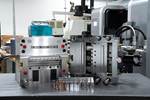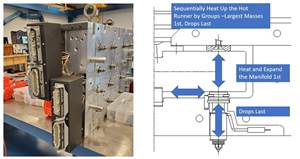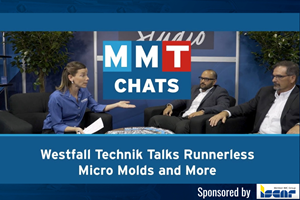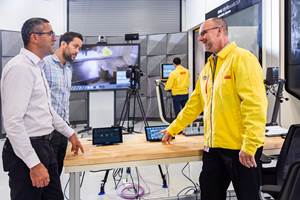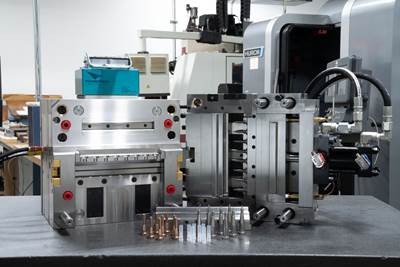MMT Chats: Vials for the Vaccine/Antibody Testing
COVID has made work a little more challenging but it is also teaching teams “to do things a little bit differently” so they can turn jobs around a lot faster. MMT Editorial Director Christina Fuges chatted with one Illinois mold builder and molder who did not take on PPE, but instead, focused on tooling for vials used to collect DNA for vaccine/antibody development.
Share
Read Next
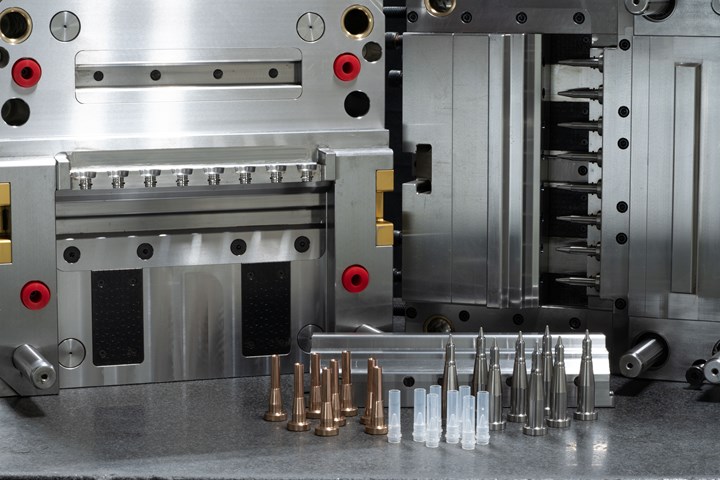
Tri-Par Die & Mold Corp. has been doing work for the medical research industry for about 12 years, so the complexity and meaning of medical work is not lost on this team. However, when one of its West Coast customers dropped seven new molds on the team for making vials to collect DNA specifically to aid the development of a vaccine /antibody for the virus, they gladly accepted the challenge to deliver in 12 weeks.
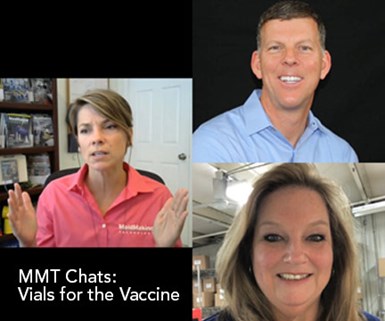
Tri-Par Die & Mold’s General Manager David Plocinski and Marketing and Sales Manager Rita Baranowski join MoldMaking Technology’s Christina Fuges for a quick MMT Chat about COVID-19.
These vials require hot runner molds. To date, the biggest challenge to achieving their quoted lead time has been getting the hot runner suppliers to turn their delivery around more quickly.
“Hot runner suppliers are the critical path in terms of getting all these molds out. The customer wants the molds in 10 weeks; we quoted 12 weeks because of the hot runner lead times. The customer is offering us thousands of dollars for every week early,” GM David Plocinski says.
Adding to the challenge is the fact that these vials are very challenging, they are about 3/8” in diameter by an inch-and-a-half long. They are very thin-walled tubes. At some points, the wall thickness gets down to 0.008 thick, according to Plocinski.
In molding, “you get a lot of pressure build-up, so it is essential that the hot runner drops and nozzles can withstand that kind pressure. The machines that are running these molds are filling the parts in a fraction of a second. Cycle times for the 8-24 cavity molds are sub-10 seconds.” Plocinski says.
As they wait for the hot runner system, Tri-Par Die & Mold and its network of shops are completing what they can on the molds.
“The lead time on these molds are short, so we are utilizing a network of vetted shops in the area with which we have relationships (through the AMBA Chicago Chapter) to help us shorten the deliveries on some of these tools,” Plocinski says. “We have three mold shops working on these molds to get them built and delivered.”
Taking Action
With a combination of employees and temporary workers, business has been “steady slow” for this South Elgin, Illinois mold builder and molder.
Strategically scheduling the staff at Tri-Par Die & Mold has helped the team implement social distancing and more in-depth cleaning processes. Plocinski also mentions that their regular style of stand-up production meetings has proven even more efficient during these trying times.
“Standing meetings are more productive, quicker, and allow everyone to get to the point. Plus, it also helps us to naturally practice social distancing,” Plocinski says.
“Taking action” with critical COVID-19-related work and communication have been vital to employee morale these days. An attitude of “working together to get through this” is evident throughout the 60,000-square-foot facility the team moved into about five years ago.
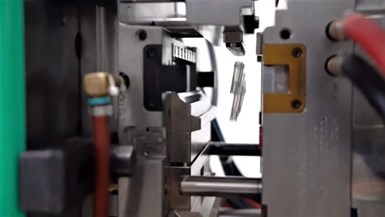
The machines that are running these molds are filling the parts in a fraction of a second. Cycle times for the 8 cavity molds are sub-10 seconds.
Tri-Par Die & Mold offers mold construction and injection molding for an array of industries, including the medical, food container, water purification, and automotive lens markets.
A five-person tool shop is dedicated to new molds and repair, with 24-hour, five-day-a-week production molding using its 26 molding machines (ranging from 50 tons up to 720 tons).
“Our diversified business model provides a tremendous variety of customers and experiences that regularly puts our team to the test in developing solutions,” Plocinski says. “We are fortunate to work with customers who do research and push the envelope, and we are committed to incorporating what we learn from each job into all of our new tooling.”
Related Content
The Ins and Outs of Hot Runner Temperature Control
A training checklist that explains the why and how of proper hot runner temperature control and system management.
Read MoreMMT Chats: Westfall Technik Talks Runnerless Micro Molds and More
Westfall Technik sits down with MMT Editorial Director Christina Fuges to discuss their new micro hot runner technology, the closeness of the moldmaking community and the importance of integration. This episode is brought to you by ISCAR with New Ideas for Machining Intelligently.
Read MoreThe Role of Social Media in Manufacturing
Charles Daniels CFO of Wepco Plastics shares insights on the role of social media in manufacturing, how to improve the “business” side of a small mold shop and continually developing culture.
Read MoreHow to Use Continuing Education to Remain Competitive in Moldmaking
Continued training helps moldmakers make tooling decisions and properly use the latest cutting tool to efficiently machine high-quality molds.
Read MoreRead Next
Experience, Knowledge Base, and Creativity Give Tri-Par An Edge in Molds for High-Flow Material Parts
Expertise in building molds for parts made from highly-engineered materials and automation for molding gives Tri-Par Die and Mold Corp. key mechanisms for growth.
Read MoreAre You a Moldmaker Considering 3D Printing? Consider the 3D Printing Workshop at NPE2024
Presentations will cover 3D printing for mold tooling, material innovation, product development, bridge production and full-scale, high-volume additive manufacturing.
Read MoreHow to Use Continuing Education to Remain Competitive in Moldmaking
Continued training helps moldmakers make tooling decisions and properly use the latest cutting tool to efficiently machine high-quality molds.
Read More

